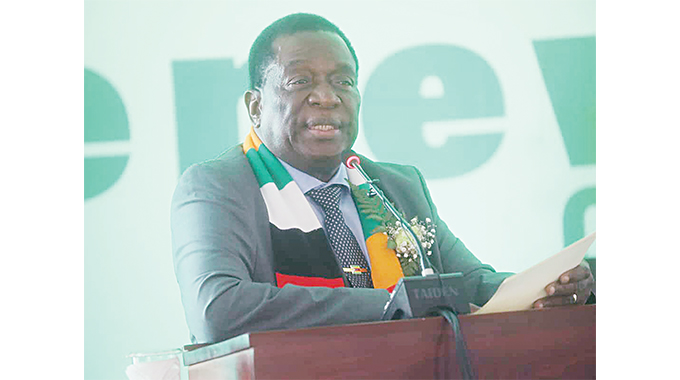Renewable energy-based grids to power rural industrialisation: ED

Prosper Ndlovu, Recently in Victoria Falls
PRESIDENT Mnangagwa has said the increased momentum by Zimbabwe to facilitate construction of more renewable energy-based grid systems is critical in powering robust rural industrialisation while helping the country meet global climate adaptation targets.
In line with the devolution and decentralisation agenda, the Second Republic is spearheading programmes aimed at capacitating rural communities to participate in mainstream economy by being part of the productive sector.
Through exploiting locally available resources, rural communities are encouraged to establish industries that utilise locally available raw materials to produce goods and services for the domestic and export markets.
Ensuring adequate and reliable energy supply is one of the key enablers in realising this potential, and President Mnangagwa is convinced that rolling out renewable energy-based grid systems holds the key in this regard.
Zimbabwe is fast attracting more investor interest in solar projects as one of the low hanging fruits while attention is also being directed at harnessing waste-to-energy related potential, and wind, among others.
“The availability of electricity and electricity-based services within rural areas, particularly through the deployment of renewable energy-based technologies will result in increased production and productivity while averting rural-urban migration,” said President Mnangagwa while addressing delegates to the International Renewable Energy Conference and Expo, which ended in Victoria Falls on Thursday.
“Efforts must, therefore, be made with regards to ensuring that our energy sector matrix accommodates the devolution and decentralisation agenda.
“This must seek to propel the modernisation, and industrialisation in both rural and urban areas across all our provinces.”
Proffering and implementing deliberate policies, as well as strategies towards making energy, including renewable sources available to rural communities, particularly to power rural industrialisation, are at the heart of the Government vision of transforming Zimbabwe into an upper middle-income economy by 2030.
In that regard, President Mnangagwa commended the capacitation of the Rural Electrification Fund, which he said will be instrumental in oiling the urgent construction of more renewable energy-based grid systems.
“Partners keen to collaborate with the Rural Electrification Agency towards deploying renewable energy-based solutions across our rural communities are welcome,” said President Mnangagwa.
Through the Rural Electrification Fund, Zimbabwe, in keeping with global trends, is focused on providing support for the development of the on and off grid sectors for the power/energy sector to thrive.
According to the 2023 National Budget Statement, 10 009 rural institutions have been electrified nationwide using both grid and solar technologies, with a total of 430 solar mini grid systems having been installed at remote rural schools and clinics countrywide as at November 2022.
This year the Rural Electrification Fund will channel ZWL$18,3 billion and an additional ZWL$1 billion from the fiscus, to accelerate the electrification and off-grid solutions for rural communities.

This is critical in achieving more equitable regional access to electricity, maximising the economic, social and environmental benefits of rural electrification subsidies, promoting expansion of the grid and the development of off-grid electrification, among others.
The ultimate goal is to improve the living standards, socio-economic and environmental conditions of rural dwellers.
Stressing the need to expedite the completion of the National Energy Efficiency Policy, the President said this was critical in ensuring that available energy resources are used efficiently across various sectors of the economy.
“To augment this, the National Solar Water Heating Programme and the adoption of alternative efficient energy technologies such as biogas digesters should be promoted,” said President Mnangagwa.
“Training and capacity building programmes across communities to enhance the adoption of clean renewable energy technologies are equally important.”
Citing the need to embrace innovation, research and development, he challenged Innovation Hubs and Industrial Parks within institutions of higher learning to be on the forefront in facilitating input from young talent towards unlocking ground breaking clean energy technologies.
This must include exploring the development of hybrid models, which allow harnessing of both wind and solar energy for diversified electricity generation, the President added.
Given Zimbabwe’s rich mineral deposits, which are critical to the energy value chain such as coal and lithium, he said more domestic value addition and beneficiation must be pursued with urgency.
“Such positive policy pronouncements should motivate active participation in the lithium battery value chain. This will contribute to job creation and economic growth, while also ensuring self-financing for the development and adoption of renewable energy technologies,” said President Mnangagwa.
Regarding the global ambition to reduce harmful greenhouse gas emissions, he said Zimbabwe, as a member of the United Nations Conference of Parties, would continue to support the overall aims and objectives of collective international interventions.
He also urged conference delegates to reflect on these pertinent dynamics in their deliberations, particularly the need for a just transition and an increase in internal green energy power generation capacity.
To that end, the President challenged industry players to play their part to buttress realisation of set targets of the National Renewable Energy and National Climate Policies, including the Revised Nationally Determined Contributions.
He expressed dismay over the minimal impact of the Loss and Damage Fund to countries such as Zimbabwe that are victims of global warming saying the situation on the ground demands that regional states and the country in particular, should develop strategies and mechanisms to fund projects through local innovative instruments.











Comments